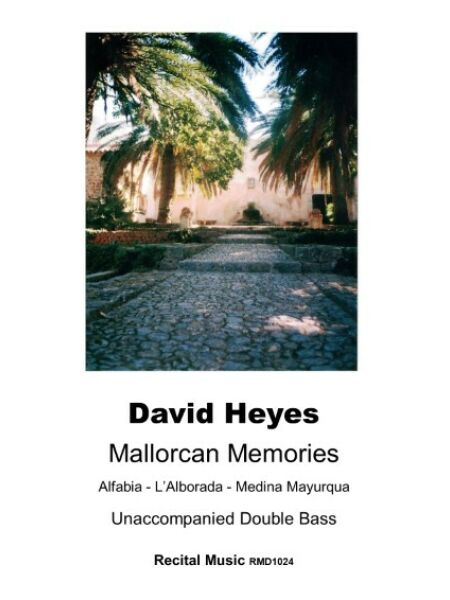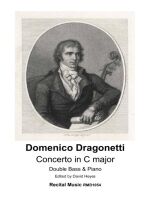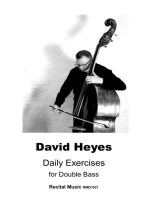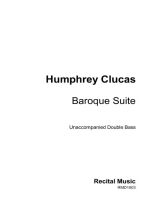Mallorcan Memories

Product code:
£8.50
Description
Three exciting, colourful and dramatic pieces inspired by the history, landscape and beauty of the Spanish island of Mallorca. They can be performed singly or as a suite and each employs a number of evocative playing effects to create atmosphere, variety and interest.
Each piece explores the different sonorities and colours of the solo double bass in music which is exotically engaging from start to finish. Mallorcan Memories is aimed at the intermediate-advanced bassist.
Alfabia (Mallorcan Memories No.1) was completed on 4/5 February 2017 and is named after a beautiful old manor house and garden on Mallorca. Over the years I have given around thirty recitals on the island and have also directed masterclasses and workshops at the Palma Conservatoire and Inca School of Music, thanks to my good friend Martin Gregg, Principal Bass of the Symphony Orchestra in Palma. My first visit to Mallorca was in March 1998 as a guest of the Mallorcan Tourist Board and ‘The London Double Bass Trio’, newly formed for the tour, gave nine concerts over five days. The trio comprised Ferenc Szucs (cello), Martin Gregg (double bass) and I, and our repertoire was varied to say the least. Tony Osborne had composed ‘Intrada, Romanza & Scherzo’ for Martin and I the previous year and we were able to play the suite in each concert alongside music by Miloslav Gajdoš, Rossini, Bottesini, Bach, William Holborne and Thomas Weelkes.
My diary entry for Monday 9 March 1998 reads: ‘My free hire car arrived today. I didn’t tell Martin that I had never driven abroad before – it would only have worried him – and I managed to drive 100 yards from the front of the hotel into the car park – perspiring profusely! It’s going to be fun tomorrow!… The first concert was at Alfabia, a beautiful old country house set in magnificent gardens and about 17 km from Palma. The short concert was only for bass duo and one of the main rooms was turned into a mini-concert hall for the morning. Afterwards we drank freshly-squeezed orange juice in the sunlit garden, under the shade of exotic palm trees.’
I have always remembered Alfabia, having played there twice, alongside visiting as a tourist, and love the house and its exotic gardens. The website description gives an idea about its history: “The structure of the house has Roman-Andalusian roots. We find features and elements of different styles: Arabic, Gothic, Renaissance, Baroque, Roman, Rococo and even English in the decoration of the rooms…The coffered ceiling, the work of Almohad craftsmen, was built in 1170. It is worked in pine and holm-oak, with inlays forming beautiful and typical arabesques. On the lower part are inlaid the coats-of-arms of the Arabic families who lived on the estate, and next to those of the Moor Ben-Abet of the thirteenth century, the bars of the Kingdom of Aragon and Catalonia superimposed. In the frieze reads “Allah is great. Allah’s is the power. There is no other God but Allah”.
The name Alfabia derives from ‘al fabi’, which means jar of olives in Arabic, and I based my piece on the D (Shahnaz) maqam, a scale using the notes D, Eb, F#, G, A, Bb, C#, D. The maqams (Arabic for position) are scales or modes in music from the Middle East and I felt this particular maqam had the correct feel to interpret this old manor house which has many architectural influences, but especially Moorish and Arabic.
Alfabia lasts around three and a half minutes and employs many playing effects, notably arco, pizzicato, sul ponticello, double stops in thumb position, col legno, two and three-part chords alongside upper and lower drones. The maqam, with its semitones and augmented intervals, produces music of an exotic or Arabic feel and my aim was to write a piece which had great energy and momentum from start to finish. The repeat of themes and material, often changed or amended, was intentional and the final few lines build in speed and momentum until coming to a complete and sudden conclusion after such a flurry of energy and excitement.
Alfabia is dedicated to my good friend May Halyburton in Edinburgh, who I first met on Mallorca when she was a bassist with the Symphony Orchestra in Palma, and is a great player, educationalist and teacher, but is also passionate about the double bass in its many guises.
Alfabia was premiered by the composer on Sunday 19 February 2017 at Galicia Graves (Conservatorio de Culleredo), Spain who also gave its UK premiere at Green Hammerton Hall (York, UK) on Sunday 5 March 2017. Susan Hagen performed the US premiere at Berklee College of Music (Boston, USA) on 6 March 2020.
“I love it is a great piece. Thank you for your fabulous works. I am very grateful to send me your work.” [Glen Rodriguez]
“It’s a fabulous piece… it is a wonderful addition to the double bass repertoire ” [May Halyburton]
“Lovely melody David” [Diana Ford]
“This piece very much follows the tradition of unaccompanied pieces for the double bass in a quasi improvised folk style such as we are used to from Rabbath, Gajdos and Grillo…Alfabia lasts about three and a half minutes employing many special effects: ponticello, col legno, pizzicato chords and drones. The performer needs to be well acquainted with notes high on the D-strings and have a bass set up to accommodate playing here whilst grazing the G- string. It is probably not as hard as it first looks once the various effects have been learned. An impossible page turn requires a photocopy or learning the first page from memory. It is an effective concert/competition piece concluding with an accel. molto al fine.” [Cathy Elliott / ARCO-ESTA]
L’Alborada (Mallorcan Memories No.2) was inspired by a festival in the town of Pollensa, on the island of Mallorca, and is dedicated to Luis Guillermo Pérez in Venezuela. On 2 August each year, Pollensa celebrates the day of its patroness, Our Lady of the Angels. The inhabitants dress in white and in colours to receive their patroness and to defend their town from attack by enemy pirates in a mock battle between the Christians and the Moors. The festival begins at 5.00am when, after the street party, the band strikes up the Alborada, first performed in 1882. L’Alborada is in two parts with slow, lyrical and Moorish-inspired melodies, interspersed with evocative strummed pizzicato chords, before the mock battle is recreated with frenzied and exciting music which pushes forward to a fast and explosive conclusion.
“I have already given several readings to LÁlborada and every time I like it more, it is under your seal of composer, I really love it. I spoke with Valentina Betancourt and she is going to premiere, she was very happy with the fact of playing the first audition in these latitudes.” [Luis Guillermo Pérez]
L’Alborada was premiered by David Heyes on Saturday 10 March 2018 at Galicia Graves, (Conservatorio de Culleredo, Galicia) Spain. David also gave its UK premiere on Saturday 29 September 2018 at Church of St Laurence, East Harptree, Somerset. Susan Hagen performed the US premiere at Berklee College of Music (Boston, USA) on 6 March 2020.
Medina Mayurqa (Mallorcan Memories) dates from July/August 2019 and was composed for Susan Hagen in Boston (Principal Bass, Boston Pops Orchestra / Berklee College of Music). It is the slowest of the three pieces, episodic in design, and also based on the D (Shahnaz) maqam. Recurring motifs create unity and cohesion, with contrasting arco and pizzicato styles adding colour and texture, before the music slowly fades away into nothingness.
Medina Mayurqa is the Arabic name for the city currently known as Palma, the capital of Mallorca. When the Muslim conqueror Isam al-Khawlani took control of the island in 903, the old Roman city of Palma was practically abandoned and in ruins. The Muslims adapted it to their needs by building inns, baths and mosques, and although initially they partially respected the old urban layout, they quickly modified it. Today, very few visible remains of Medina Mayurqa remain although its urban layout is largely preserved. The most important remains are the old fortress, the Arab baths and the Almudaina gate.
“This piece is more gorgeous than I could have imagined!” [Susan Hagen]
“This looks awesome!!!” [P. Kellach Waddle]
Medina Mayurqa was premiered by Susan Hagen at Berklee College of Music (Boston, USA) on Tuesday 12 November 2019.
[Programme notes by David Heyes]
Photo Credit: Sarah Poole
Description
Three exciting, colourful and dramatic pieces inspired by the history, landscape and beauty of the Spanish island of Mallorca. They can be performed singly or as a suite and each employs a number of evocative playing effects to create atmosphere, variety and interest.
Each piece explores the different sonorities and colours of the solo double bass in music which is exotically engaging from start to finish. Mallorcan Memories is aimed at the intermediate-advanced bassist.
Alfabia (Mallorcan Memories No.1) was completed on 4/5 February 2017 and is named after a beautiful old manor house and garden on Mallorca. Over the years I have given around thirty recitals on the island and have also directed masterclasses and workshops at the Palma Conservatoire and Inca School of Music, thanks to my good friend Martin Gregg, Principal Bass of the Symphony Orchestra in Palma. My first visit to Mallorca was in March 1998 as a guest of the Mallorcan Tourist Board and ‘The London Double Bass Trio’, newly formed for the tour, gave nine concerts over five days. The trio comprised Ferenc Szucs (cello), Martin Gregg (double bass) and I, and our repertoire was varied to say the least. Tony Osborne had composed ‘Intrada, Romanza & Scherzo’ for Martin and I the previous year and we were able to play the suite in each concert alongside music by Miloslav Gajdoš, Rossini, Bottesini, Bach, William Holborne and Thomas Weelkes.
My diary entry for Monday 9 March 1998 reads: ‘My free hire car arrived today. I didn’t tell Martin that I had never driven abroad before – it would only have worried him – and I managed to drive 100 yards from the front of the hotel into the car park – perspiring profusely! It’s going to be fun tomorrow!… The first concert was at Alfabia, a beautiful old country house set in magnificent gardens and about 17 km from Palma. The short concert was only for bass duo and one of the main rooms was turned into a mini-concert hall for the morning. Afterwards we drank freshly-squeezed orange juice in the sunlit garden, under the shade of exotic palm trees.’
I have always remembered Alfabia, having played there twice, alongside visiting as a tourist, and love the house and its exotic gardens. The website description gives an idea about its history: “The structure of the house has Roman-Andalusian roots. We find features and elements of different styles: Arabic, Gothic, Renaissance, Baroque, Roman, Rococo and even English in the decoration of the rooms…The coffered ceiling, the work of Almohad craftsmen, was built in 1170. It is worked in pine and holm-oak, with inlays forming beautiful and typical arabesques. On the lower part are inlaid the coats-of-arms of the Arabic families who lived on the estate, and next to those of the Moor Ben-Abet of the thirteenth century, the bars of the Kingdom of Aragon and Catalonia superimposed. In the frieze reads “Allah is great. Allah’s is the power. There is no other God but Allah”.
The name Alfabia derives from ‘al fabi’, which means jar of olives in Arabic, and I based my piece on the D (Shahnaz) maqam, a scale using the notes D, Eb, F#, G, A, Bb, C#, D. The maqams (Arabic for position) are scales or modes in music from the Middle East and I felt this particular maqam had the correct feel to interpret this old manor house which has many architectural influences, but especially Moorish and Arabic.
Alfabia lasts around three and a half minutes and employs many playing effects, notably arco, pizzicato, sul ponticello, double stops in thumb position, col legno, two and three-part chords alongside upper and lower drones. The maqam, with its semitones and augmented intervals, produces music of an exotic or Arabic feel and my aim was to write a piece which had great energy and momentum from start to finish. The repeat of themes and material, often changed or amended, was intentional and the final few lines build in speed and momentum until coming to a complete and sudden conclusion after such a flurry of energy and excitement.
Alfabia is dedicated to my good friend May Halyburton in Edinburgh, who I first met on Mallorca when she was a bassist with the Symphony Orchestra in Palma, and is a great player, educationalist and teacher, but is also passionate about the double bass in its many guises.
Alfabia was premiered by the composer on Sunday 19 February 2017 at Galicia Graves (Conservatorio de Culleredo), Spain who also gave its UK premiere at Green Hammerton Hall (York, UK) on Sunday 5 March 2017. Susan Hagen performed the US premiere at Berklee College of Music (Boston, USA) on 6 March 2020.
“I love it is a great piece. Thank you for your fabulous works. I am very grateful to send me your work.” [Glen Rodriguez]
“It’s a fabulous piece… it is a wonderful addition to the double bass repertoire ” [May Halyburton]
“Lovely melody David” [Diana Ford]
“This piece very much follows the tradition of unaccompanied pieces for the double bass in a quasi improvised folk style such as we are used to from Rabbath, Gajdos and Grillo…Alfabia lasts about three and a half minutes employing many special effects: ponticello, col legno, pizzicato chords and drones. The performer needs to be well acquainted with notes high on the D-strings and have a bass set up to accommodate playing here whilst grazing the G- string. It is probably not as hard as it first looks once the various effects have been learned. An impossible page turn requires a photocopy or learning the first page from memory. It is an effective concert/competition piece concluding with an accel. molto al fine.” [Cathy Elliott / ARCO-ESTA]
L’Alborada (Mallorcan Memories No.2) was inspired by a festival in the town of Pollensa, on the island of Mallorca, and is dedicated to Luis Guillermo Pérez in Venezuela. On 2 August each year, Pollensa celebrates the day of its patroness, Our Lady of the Angels. The inhabitants dress in white and in colours to receive their patroness and to defend their town from attack by enemy pirates in a mock battle between the Christians and the Moors. The festival begins at 5.00am when, after the street party, the band strikes up the Alborada, first performed in 1882. L’Alborada is in two parts with slow, lyrical and Moorish-inspired melodies, interspersed with evocative strummed pizzicato chords, before the mock battle is recreated with frenzied and exciting music which pushes forward to a fast and explosive conclusion.
“I have already given several readings to LÁlborada and every time I like it more, it is under your seal of composer, I really love it. I spoke with Valentina Betancourt and she is going to premiere, she was very happy with the fact of playing the first audition in these latitudes.” [Luis Guillermo Pérez]
L’Alborada was premiered by David Heyes on Saturday 10 March 2018 at Galicia Graves, (Conservatorio de Culleredo, Galicia) Spain. David also gave its UK premiere on Saturday 29 September 2018 at Church of St Laurence, East Harptree, Somerset. Susan Hagen performed the US premiere at Berklee College of Music (Boston, USA) on 6 March 2020.
Medina Mayurqa (Mallorcan Memories) dates from July/August 2019 and was composed for Susan Hagen in Boston (Principal Bass, Boston Pops Orchestra / Berklee College of Music). It is the slowest of the three pieces, episodic in design, and also based on the D (Shahnaz) maqam. Recurring motifs create unity and cohesion, with contrasting arco and pizzicato styles adding colour and texture, before the music slowly fades away into nothingness.
Medina Mayurqa is the Arabic name for the city currently known as Palma, the capital of Mallorca. When the Muslim conqueror Isam al-Khawlani took control of the island in 903, the old Roman city of Palma was practically abandoned and in ruins. The Muslims adapted it to their needs by building inns, baths and mosques, and although initially they partially respected the old urban layout, they quickly modified it. Today, very few visible remains of Medina Mayurqa remain although its urban layout is largely preserved. The most important remains are the old fortress, the Arab baths and the Almudaina gate.
“This piece is more gorgeous than I could have imagined!” [Susan Hagen]
“This looks awesome!!!” [P. Kellach Waddle]
Medina Mayurqa was premiered by Susan Hagen at Berklee College of Music (Boston, USA) on Tuesday 12 November 2019.
[Programme notes by David Heyes]
Photo Credit: Sarah Poole



